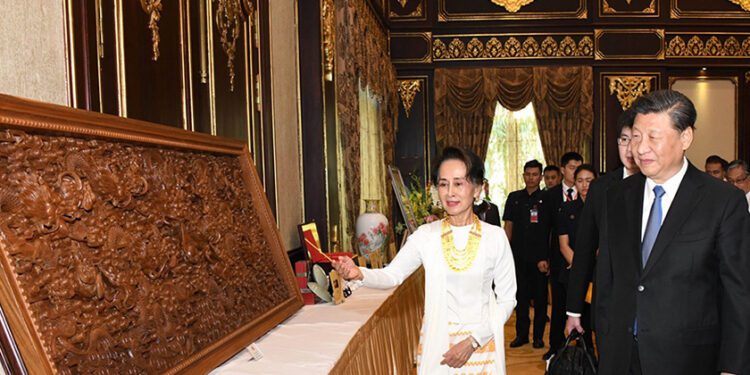A month after the military’s seizure of power in Myanmar, China is still reluctant to characterize the situation as a coup. Instead, it urges “all parties” to exercise restraint regardless of the rise of civilian casualties in the crisis. In his latest response to the Myanmar’s political turmoil on March 7, Chinese State Councilor and Foreign Minister Wang Yi stated, “China supports the Association of Southeast Asian Nations (ASEAN) to uphold the principles of non-interference in internal affairs and making decisions through consensus, mediate in the ASEAN way and seek common ground.” China sends a clear signal that it opposes coercive measures to pressure the military regime in Myanmar.
Chinese foreign policy experts argue that China does not prefer the coup as a stable business environment that best serves China’s economic interests. The Belt and Road Initiative (BRI) is China’s flagship diplomatic tool connecting to its national rejuvenation aspiration. The China-Myanmar Economic Corridor (CMEC) that is a key component of the BRI helps China achieves the two ocean strategy. In the past decade, China has been cultivating a cordial relationship with Daw Aung San Suu Kyi’s National League for Democracy (NLD) for the advancement of CMEC. Nevertheless, they also point out that China will not abandon its long-established principle of “non-interference in the internal affairs of other countries.”
People in Myanmar do hope that China can respect their country’s sovereignty. The older generation still remembers the Chinese Communist Party’s (CCP) military, financial and intelligence support to the Burma Communist Party (BCP) that aimed to topple the Ne Win government through armed struggle in the 1960s-1970s. Only in the post-Mao era, did the CCP cut ties with BCP to normalize relations with Burma in the 1980s. To date, there is on-going speculation about China’s influence over ethnic armed groups along the China-Myanmar border.
Outside Myanmar, there are indications that China might relax its principle of non-interference in humanitarian crises. In the face of the humanitarian crisis in Darfur in the 2000s, China did utilize its diplomatic influence to persuade Sudan to accept the deployment of a United Nations peacekeeping mission to the country. Also, it did not block other United Nations Security Council (UNSC) members referring Darfur to the International Criminal Court (ICC). Some argue that it was due to an escalation of international pressure that connected the events in Sudan to the 2008 Beijing Olympics.
Amid the 2011 Libyan civil war, China condemned the North Atlantic Treaty Organization’s (NATO) military intervention that began in March that year for violating the target state’s sovereignty. When the anti-government forces gained momentum following NATO’s operation, China started to engage with Libya’s National Transnational Council (NTC), the leading opposition force, and recognized it as an “important dialogue partner”. In June, before the NTC took Tripoli and the fall of de facto leader Muammar Gaddafi, Chinese Foreign Minister Yang Jiechi received NTC’s leader Mahmoud Jibril in Beijing. After the NTC controlled the capital in August, Chinese Foreign Ministry even claimed that, “We respect the Libyan people’s choice.” Alongside the well-being of civilians, China was deeply concerned about its investment in the country, in particular its oil investment.
Unlike the situation in Libya in 2011, the people of Myanmar do not need a civil war today to express public opinion. Election results in the 2020 elections manifested the people’s will. In fact, Chinese President Xi Jinping also congratulated Daw Aung San Suu Kyi and her NLD’s victory in the election last November. Nationwide anti-coup political mobilization since February has also demonstrated the people’s political choice.
President U Win Myint, State Counselor Daw Aung San Suu Kyi and other leaders have been detained since the coup on Feb. 1. The Committee Representing Pyidaungsu Hluttaw (CRPH) comprises elected members of the parliament was formed as a consequence. Its establishment aims to compete for international legitimacy with the military junta. Speaking at the UN General Assembly on Feb. 26, Myanmar’s UN Ambassador U Kyaw Moe Tun echoed the voices of people at home. He appealed to the UN not to recognize the military government and “use any means necessary to take action against the Myanmar military.”
The international community, including China, has to determine which government should be the legitimate government in Myanmar. China pledges to play a constructive role in Myanmar. Now it is a moment of truth for China. Will China respect the authority of the military government that seized power by force? Or will it respect the choice of millions of people in Myanmar who chose their government by vote? China can repeat its principle of non-interference, but this could inevitably undermine its image and long-term interests in Myanmar.
Debby S.W. Chan is a visiting fellow in the Department of Public Policy, City University of Hong Kong. Her research concerns Belt and Road projects in Southeast Asia. Her views are her own.
You may also like these stories:
ASEAN Members on Myanmar: Agreeing to Disagree
Thailand’s Dilemma in Myanmar Crisis
Re-imagining Myanmar – The Mother of All “Critical Junctures”

















